This post describes the outputs and outcomes from the #ProjectA Ambulance Improvement tweet chat that happened between 7pm and 8pm on 14th August 2019.
A tweet chat is a scheduled, organised conversation on Twitter focused around a specific topic. Anyone can join in a tweet chat, using the designated tweet chat hashtag, in this case #ProjectA.
The tweet chat was led by Ian Baines (#ProjectA Director) and Lynsey Oates (Community Programme Officer) who also prepared this report. It was facilitated by the NHS Horizons team (@HorizonsNHS) . The tweet chat lasted for one hour, although the conversation continued actively on Twitter for a while after the chat had ended.
These were the questions asked during the tweet chat:

What happened during the tweet chat?
The core statistics for the tweet chat were as follows:
- By the time that the tweet chat finished at 8:00pm on 14th August, 153 individuals had taken part.
- 762 tweets were sent as part of the tweet chat
- The reach of the tweet chat was 4,186,000. This is a count of the unique Twitter accounts that received a tweet about #ProjectA. It represents the size of the audience for the tweet chat conversation
The picture below shows the leading influencers from the tweet chat. The column on the left – “top 10 by mentions” – is of interest, because these are the individuals and organisations that were mentioned by other people most often in their tweets. The second column – “top 10 by tweets” shows who took part in the tweet chat most actively. This shows a wide range of people from across the NHS.
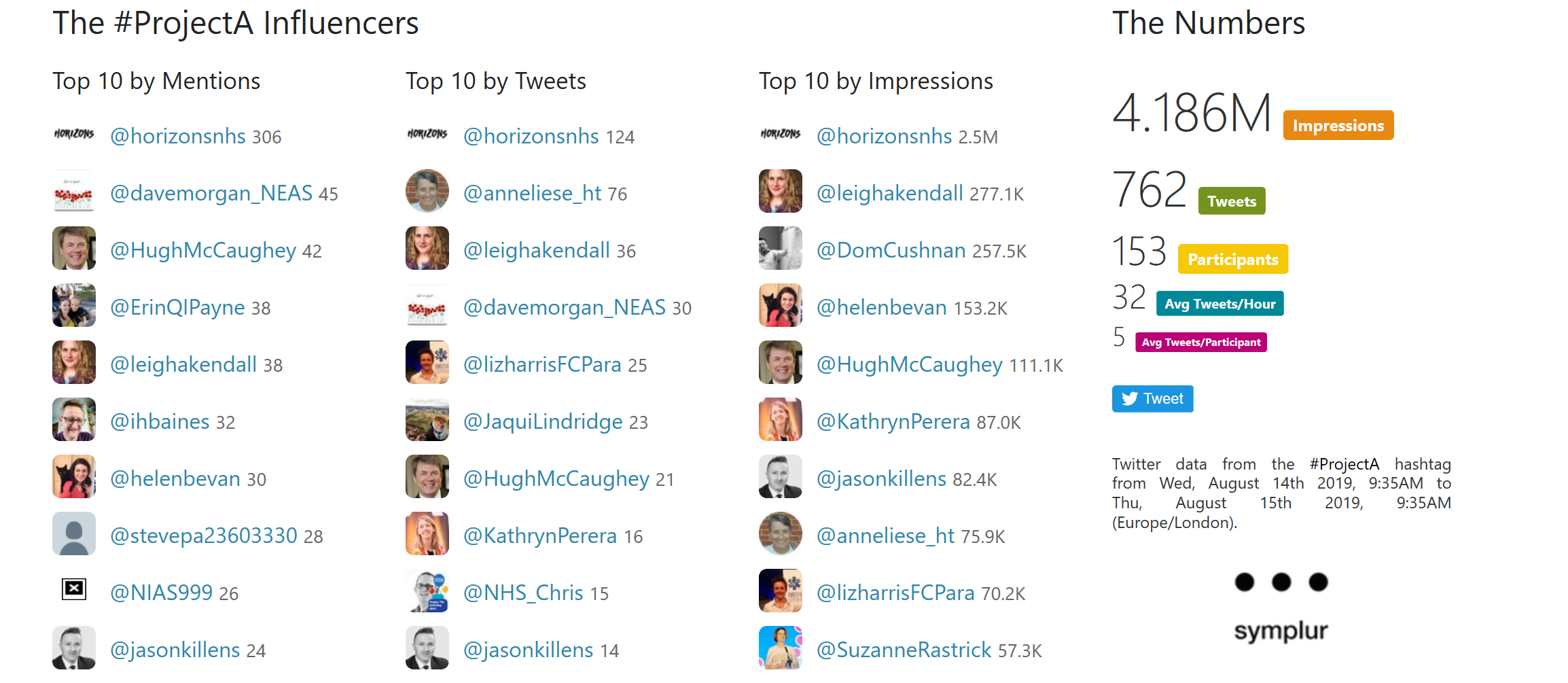
The process of the tweet chat
The first question of the evening asked people to introduce themselves. Question two was a poll that asked about how long participants had worked in the NHS. Questions three to five were all concerned with understanding how improvement could be embedded within ambulance services.
Responses to the questions can be read in the sections below. As far as possible, the responses have been grouped in the following themes:
- System Thinking
- Clinical Supervision
- Making Connections
- Creating Conversations and Finding Space
- Encourage Professional and Personal Development
- Learning and Sharing Experiences
- Supporting Well-being
- Open to Learning from Others and Opportunities to do so
- Enabling Psychological Safety
- Using Virtual Technology
- Allowing Time for QI
- The Use of Super Connectors
- Developing Supportive Leadership
- Making Efficient Use of Our Data
- Setting Clear Goals
As noted above question 2 asked participants where they were from. The results of the poll, which was open for 15 minutes, are below:

45% or respondents were from the wider NHS and 42% were from ambulance services.
Question 1 & 2 (A1) & (A2) Introduce yourselves and Where are you from:
Gill Drummon explained her role and where she was from.

Jake Balla , Mental Health Nurse from Wakefield was looking forward to taking part in the chat.
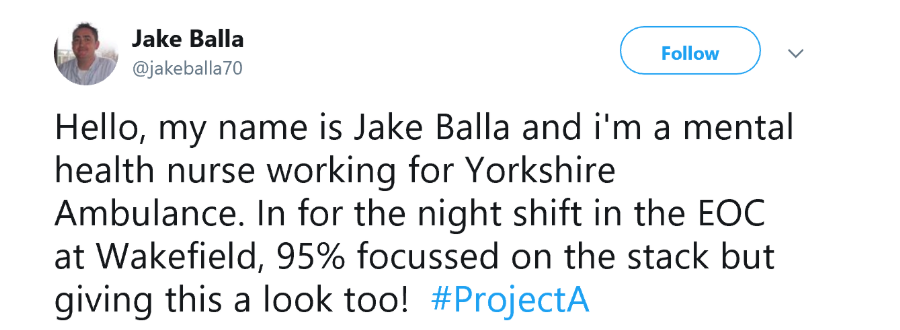
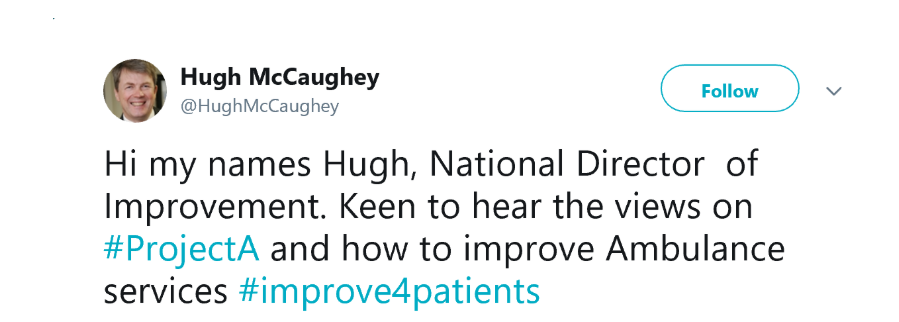
It was a first tweet chat experience for Adrian from Northern Ireland Ambulance Service.

Sasha Johnston from South West Ambulance was multi tasking! Getting her children ready for bed whilst tweeting. This demonstrates the ease of access of tweet chats, anyone can join from any location.

Suzanne Rastrick, Chief Allied Health Professions Officer for England joined the tweet chat on her journey from London.

Erin Payne QI Manager Yorkshire Ambulance was pleased with the mix of participants on the chat.


Question 3 (A3): Our theme is that everyone can contribute to improvement - what can make a difference to ambulance services?
System Thinking
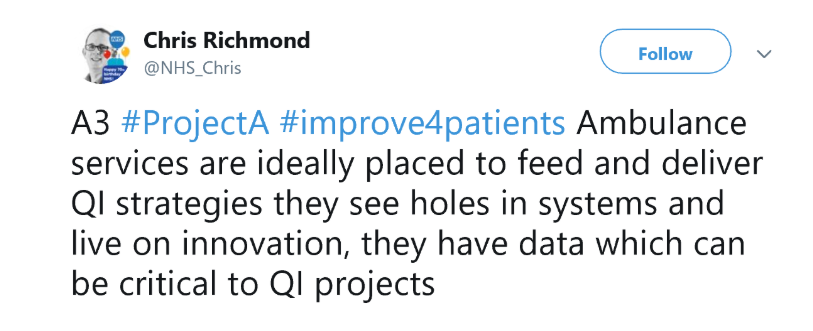
Victoria White Head of IOW at NHS Trust felt that more integration is required to make a difference to improvement in ambulance services.

John Wright , Northern Ireland Ambulance Service also raised the need for integration especially for multi disciplinary colleagues.

Clinical Supervision
Chris Richmond and Susan Rastrick proposed that Clinical Supervision would make a difference to ambulance improvement.

Making Connections
Sasha Karakusevic, NHS Horizons raised the point of making connections, and to never underestimate the power of making them.

Ian Baines and Chris Richmond were also in agreement in the importance of making connections to enable improvement.
Creating Conversations and Finding Space
Oli Evans, North East Ambulance Service would like staff to have the time to be creative and implement ideas.
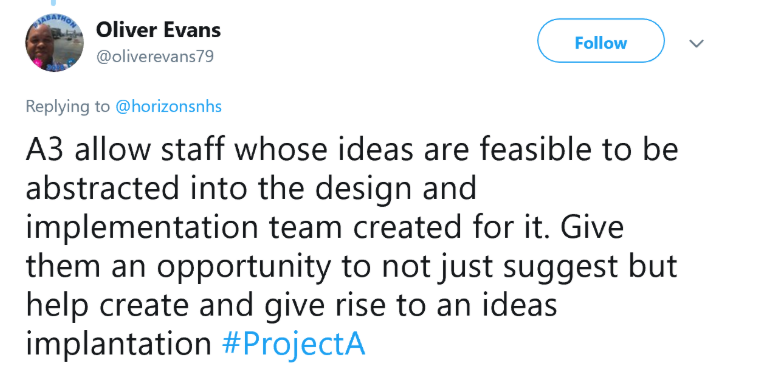
Tracy Nichols Director of Clinical Quality and Improvement at East of England Ambulance gave great examples of when staff were able to implement change by having the space and time to innovate. This resulted in improved patient care and an increase in staff morale.
Encourage Professional and Personal Development
Sasha Johnston would like ambulance staff to be encouraged to participate in ongoing education to help them further develop their skill set and contribute to the future of pre-hospital care.

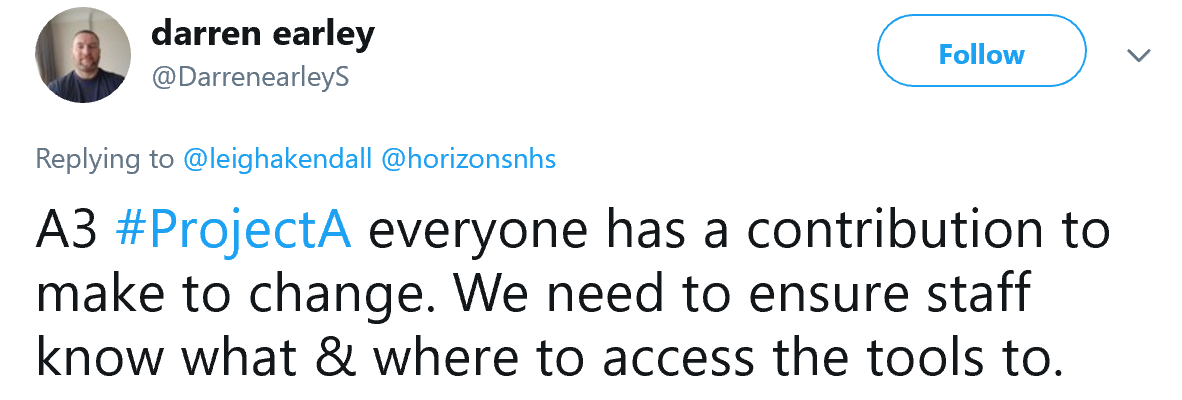
Spencer Le Grove, QI Lead Yorkshire Ambulance was in agreement in encouraging professional development. Spencer believes that investing in staff development contributes to improved ambulance services.
Supporting Well-being
Sasha Johnston connected mental health to patient care. A mentally supported workforce = quality patient care. Kathryn Perera, Horizons Director also supported this notion. The ability to contribute to improvement and think differently would be easier when there is not a constant demand on our physical, mental and emotional energies.
Open to Learning from others and Opportunities to do so
Erin Payne was keen to not over complicate improvement initiatives. It is important to make improvement feel inclusive so everyone can contribute and to keep it fun.


Kathryn Perera was keen to have time to stop and think. Nathan Steadman, Yorkshire Ambulance Service was also enthusiastic about having the space to reflect and question why do we do things in a certain way. Having time to reflect is imperative in improvement methods.
Enabling Psychological Safety
Erin Payne wanted ambulance staff to overcome the fear of failing. Encouraging all to be brave and have the confidence to step out of comfort zones and make suggestions for change.

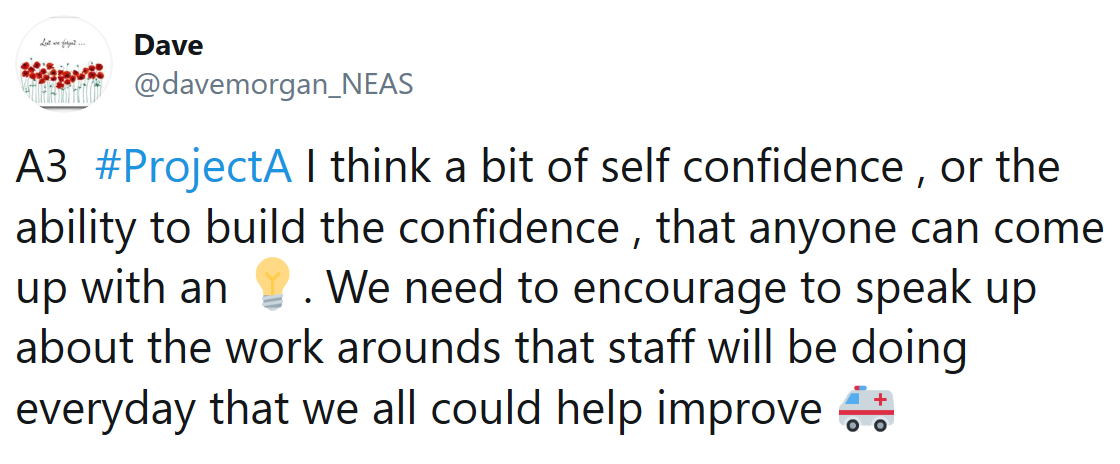
Spencer Le Grove supported the need for a safe place for the sharing of ideas with no judgement. James Gough, Welsh Ambulance Service would like to help individuals to have the confidence to take hold of their improvement ideas and bring them to the fore. Jason McKenna, Northern Ireland Ambulance Service stated there needs to be an implementation of an ideas group from staff level up and management down.
Using Virtual Technology
Steve Page , Director from Yorkshire Ambulance Service, described the benefit in using technology to involve staff in sharing and developing ideas and to help make treatment decisions more transparent. Dom Cushnan, NHS Horizons was in agreement with Steve in that we need to start to think about the best appropriate use of technology.
Question 4 (A4): What do we need more of to allow people to undertake improvement in the ambulance service?
Allowing Time for QI
Jaqui Lindridge, London Ambulance Service stated that if we were serious about improvement then we must create the time and the right environment for it to flourish.

Jason was in agreement with Jaqui, we need to find solutions to enable improvement time to be protected.

Sasha Karakusevic also raised the importance of allowing time for improvement. Ben Shepherd, East Midlands Ambulance would like to break the barriers to allow time and space for innovation and improvement.
The use of Super-Connectors
Darren Early had an idea to have identifiable change agents in each organisation to act as a facilitator of improvement.

Kathryn Perera tweeted about the evidence of the power of super-connectors. Nathan Steadman was in agreement with Darren and Kathyrn, identifying super-connectors being a key aspect to enable improvement. Ian Baines tweeted about the power and value of such connectors.
Developing Supportive Leadership
Hugh McCaughey tweeted about the importance of supportive leadership in enabling improvement.

Liz Harris, College of Paramedics wants us all to in harness the energy of those with different ideas; diverse thinking being imperative to improvement. @Inabityeah raised humble leadership, managers should be able to admit when they do not have the solutions and look to co-creation with their staff to find innovative ways of working. Tracy Nichols was keen on the permission to disrupt. Leaders need to allow ideas to be tried - it's 'ok' to fail, the important aspect is trying new ideas.
Open to Learning from others and Opportunities to do so
Pat O'Connor NHS Scotland would like to be able to connect and share ideas with others on a daily basis. Asha Cowey believes that front line staff would benefit from having opportunities to go on secondments and experience other areas of organisations. Kate Blackmore wants to encourage collaborative thinking and sharing. Carol Munt, Patient Experience, thinks that #ProjectA has been a great means for discussions and ideas.
Adrian tweeted that sharing experiences is key to allow people to undertake improvement in the ambulance service.

Making Efficient Use of our Data

Leigh Kendall was in agreement. Anna also raised the point of looking at qualitative and quantitative data. John Wright supported the notion of good data for improvement and tweeted that data is a critical aspect of improvement. Dave Morgan raised the fact that the efficient use of data contributes to better patient outcomes.
Question 5 (A5): What is your one idea that would make a contribution to improvement in the ambulance service?
Setting Clear Goals
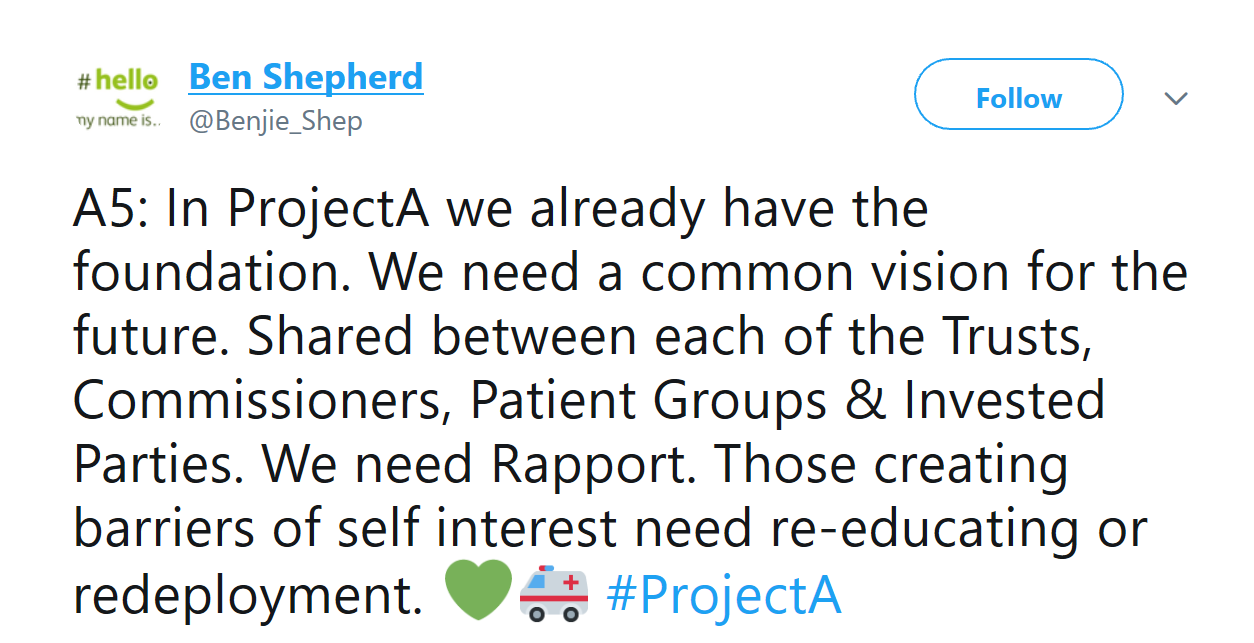 Dave Morgan tweeted a similar theme. Dave would like to see clearly defined strategies that can be shared across services.
Dave Morgan tweeted a similar theme. Dave would like to see clearly defined strategies that can be shared across services. Creating Conversations and Finding Space
Sarah Williamson from Northern Ireland Ambulance Service would like to have the time to try out new ideas especially initiatives around patient feedback.
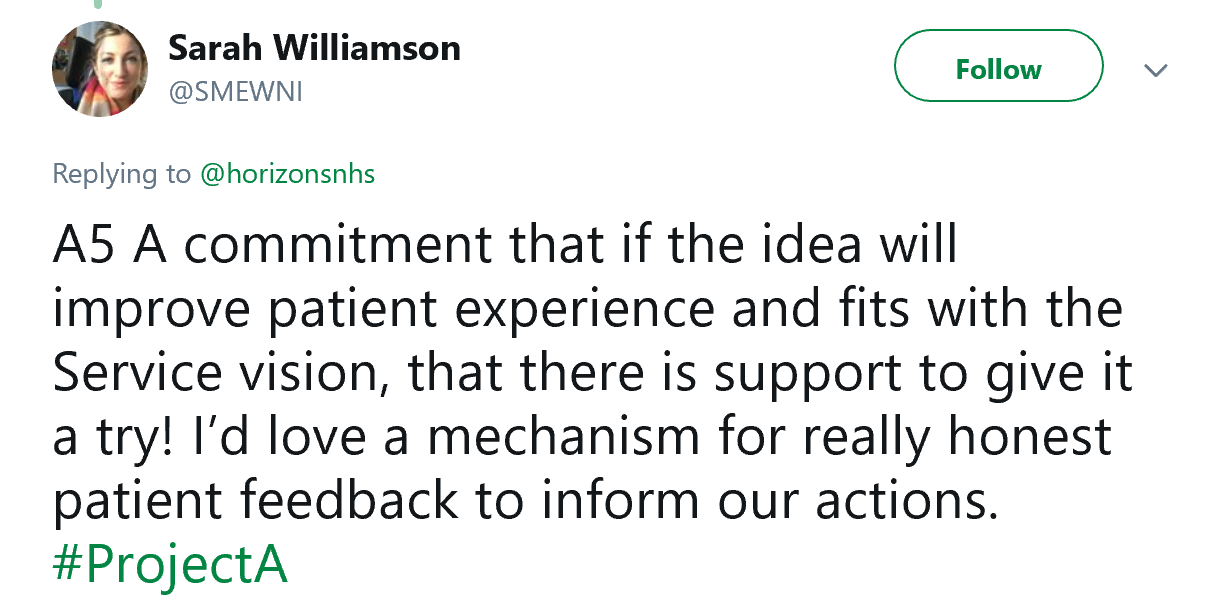
Dave Morgan would like to have the time to reflect to ensure next steps are the best steps to take.
Encourage Professional and Personal Development
Victoria White tweeted about having workforce plans in place that enable continuous professional development.
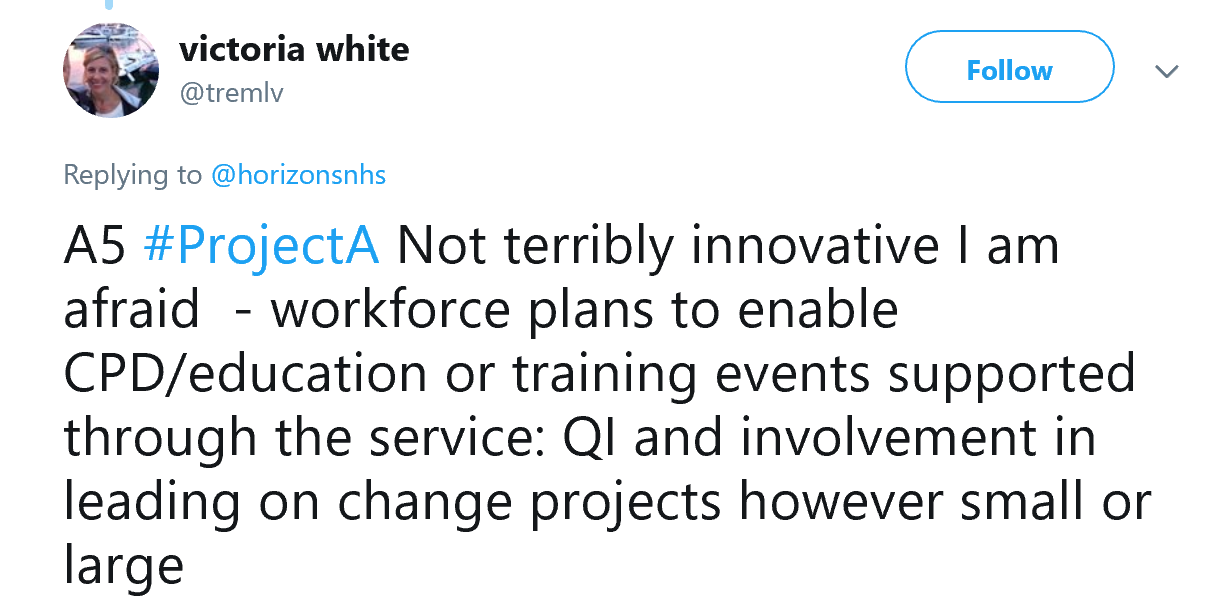

Adrian believes that by encouraging teams to build up a movement of enthusiastic and passionate people this will ultimately lead to improvement in the ambulance service. Chris Richmond was in agreement, he suggested finding, supporting the champions and connecting them to others to develop improvement.
Enabling Psychological Safety

@Inabityeah was also keen to ensure that staff felt valued. Leigh Kendall's one idea, that would make a contribution to improvement in the ambulance service, was also concerned with creating psychological safety. Staff need time and space and a the right environment to trial new ideas.
Jules Swain, Yorkshire Ambulance mentioned that staff need to know that their ideas were being listened to and valued. For ideas that are not taken forward staff need clarification as to the reasons why.

Open to Learning from Others and Opportunities to do so

Carol also suggested involving patients, carers and the public to get involved with co-creating and co-production. Jaqui Lindridge mentioned normalising a professional responsibility to improve services. Helen Bevan, NHS Horizons Chief Transformation Officer, recommended developing the skills of every ambulance service leader and supervisor to lead improvement.
Using Virtual Technology
Rosie Redstone, Personalised Care Team, wants barrier free technology to be implemented. This would enable more services to connect with each other.
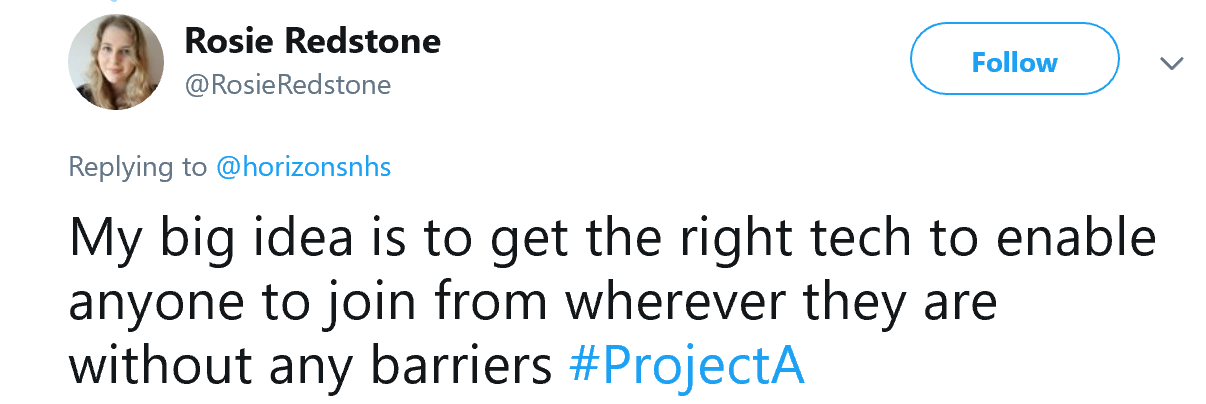
John Wright was in agreement and believes that being connected virtually would contribute to ideas being scaled up and shared more efficiently.

Feedback
 Leigh Kendall enjoyed the energy of the tweet chat, Erin Payne found it to be an enjoyable experience and Dave Morgan had respect for all that tweeted.
Leigh Kendall enjoyed the energy of the tweet chat, Erin Payne found it to be an enjoyable experience and Dave Morgan had respect for all that tweeted.

We would like to say a huge thank you to everyone that contributed to the chat, the ideas, energy and desire for improvement was fantastic. The next #ProjectA tweet chat will take place on Thursday 26th September 7pm until 8pm. We will be exploring the theme of do ambulance staff feel they can contribute to improvement? We hope you can join us.
Ian and Lynsey



/Passle/5a5c5fb12a1ea2042466f05f/MediaLibrary/Images/6168334917af5b10f4bf1d30/2022-04-14-15-27-52-040-62583d78f636e9115805b2d5.png)
/Passle/5a5c5fb12a1ea2042466f05f/MediaLibrary/Images/6168334917af5b10f4bf1d30/2022-08-05-09-59-36-465-62ecea08f636e906acfed639.jpg)
/Passle/5a5c5fb12a1ea2042466f05f/MediaLibrary/Images/6168334917af5b10f4bf1d30/2022-07-28-14-57-17-405-62e2a3cdf636e9180c9835cb.png)
/Passle/5a5c5fb12a1ea2042466f05f/MediaLibrary/Images/6168334917af5b10f4bf1d30/2022-07-20-10-16-56-533-62d7d618f636ea07987f6668.png)
/Passle/5a5c5fb12a1ea2042466f05f/MediaLibrary/Images/6168334917af5b10f4bf1d30/2022-07-15-09-55-32-858-62d13994f636ea1398e71aa9.jpg)